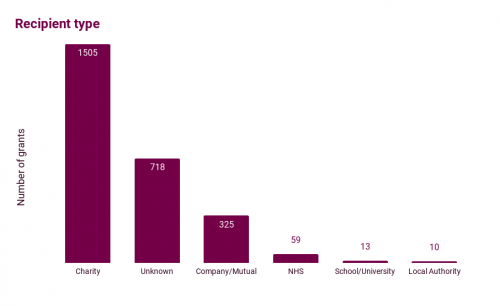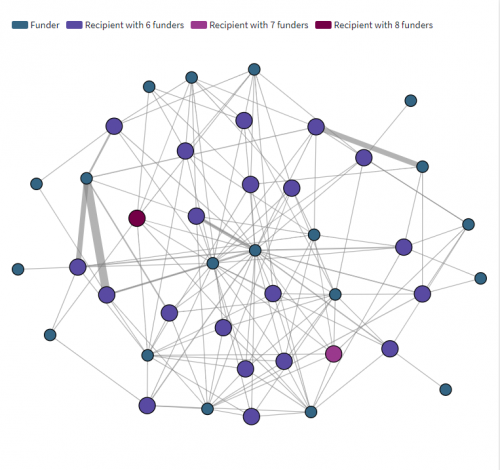What can 360Giving data tell us about funding across London?
This was first published by London Funders on their blog.
I was pleased to speak at London Funders’ first Big Network Day on 14th February. The room was filled with different kinds of grantmakers – local authorities, charitable trusts and foundations, corporate funders and hosted by the GLA – a fantastic mix of organisations that are supporting civil society organisations across the city.
I shared a platform with Vivienne Avery from the GLA, who presented some killer stats on how London is changing, and John Griffiths from Rocket Science, who gave a handy digest of recent reviews of civil society. For my part, I talked about why 360Giving was founded and what grants data tells us about funding to London. More on that later, but first some scene setting…
What’s changing in London?
Among the analysis Vivienne and John presented, the three things that most stuck with me were:
- London’s era of population growth is coming to an end. After 25 years of growth, the rate of annual change has fallen back to levels seen in the late 1990s. London’s population will continue to diversify with the growth of very old and young age groups, which has an impact on housing and communities.
- New forms of inequality and unfairness are emerging. Half of families in poverty have someone in full or part-time work. In-work poverty has been called “the problem of our times” by the Joseph Rowntree Foundation, with 1 in 10 of London’s workers in insecure employment.
- The need to address weaknesses and inequity in civil society’s funding. London has a unique set of assets as our capital city. There’s a lot of potential around civic philanthropy if we can harness the city’s wealth more effectively; but place-based funding can be hard in a London context, where needs aren’t neatly split out by borough.
Our three presentations are available here (click on “afternoon plenary session”).
A recurring theme was the opportunity that funding data offers for developing a shared understanding of needs and resources and to track changes over time. That’s where 360Giving comes in.
Why open data?
We were founded in 2015 by philanthropist Fran Perrin, who wanted to know how she could do as much as possible with her money; but Fran felt she was “giving in the dark” as she couldn’t find out who else was supporting the issues she was interested in. Inspired by open data platforms such as Citymapper, she wanted to see if something similar could work for UK philanthropy. Fast forward four years and there are now over 100 funders sharing their grants data in the standard format we have developed, including central and local government, charitable trusts, corporate funders, community foundations and lottery funders. Between them, they’re sharing £26 billion worth of grants awarded to over 180,000 organisations across the UK.
 What do we know about grantmaking in London?
What do we know about grantmaking in London?
With 24 members of London Funders now sharing their grants data openly, we’re able to get a better understanding of how these funding flows come together across the city. For this analysis we focused on one year’s worth of data, filtered out awards not directly benefiting London and found 2,630 grants worth £154 million, given to 2,137 recipients.
Most of the grants are small (under £10k) which isn’t surprising given what we know about the average turnover of charities. When you look at the types of organisations receiving grants, 70% are registered charities, with companies making up just 15%. However a third are organisation type “unknown”, which often means the recipient is a small or informal group not required to register with the Charity Commission. These “below the radar” organisations have been hard to identify but now 360Giving data makes it possible to see who they are, who funds them, what for and when – analysis that previously could have taken days to complete.
 The data also shows where these organisations are based in London, and when combined with charity data can give us new insights into the size and age of the charity. Most recipients are over 20 years old, which may be just what you’d expect to find about organisations focusing on issues that can’t be easily “fixed”; but only 177 (or 8%) of grantees are less than 5 years old. What does this mean for funders – are there not many new organisations out there to fund? Are they not approaching you? Or does your funding criteria make it harder to support organisations that are just starting out?
The data also shows where these organisations are based in London, and when combined with charity data can give us new insights into the size and age of the charity. Most recipients are over 20 years old, which may be just what you’d expect to find about organisations focusing on issues that can’t be easily “fixed”; but only 177 (or 8%) of grantees are less than 5 years old. What does this mean for funders – are there not many new organisations out there to fund? Are they not approaching you? Or does your funding criteria make it harder to support organisations that are just starting out?
The other big win of sharing open grants data is that it makes it easier to see who else is funding the same organisations, themes and places as you. We created this network graph showing recipients with six or more London Funders in common. We found 68 recipients with an annual turnover of £100k-1m with 4 or 5 funders in common. But we found that only a handful of smaller organisations (with an annual turnover of £10-100k) shared 4-5 funders. Most charities fall within this size category, but our analysis suggests that they’re supported by fewer funders, and so are more reliant on these grants and exposed to risk if things change.
 As more London Funders share their data it will be possible to check if these initial trends hold true, and dig deeper into grantmaking in London.
As more London Funders share their data it will be possible to check if these initial trends hold true, and dig deeper into grantmaking in London.
How can you use this data?
You don’t need to be a data guru to start using 360Giving data. We’ve built two platforms that make it easier for anyone to find and get insights from the data.
GrantNav allows you to search the full dataset. In literally three clicks, you can find out who else is funding the same organisations or themes that you’re interested in. You can also download the results of your search for further analysis.
360Insights brings together 360Giving data with data from the UK charity regulators and Companies House, providing new insights into funding based on the grantee’s size, age and location.
Try them out and let us know what you think – could you find what you were looking for? Was it easy? What else would you like to do with the data?
What next?
If all London Funders shared their grants data in the same open way then we’d be able to see the bigger picture of grants flows across all 33 London local authorities. Come and have a chat with us if you’d like to find out how to do this: support@threesixtygiving.org
We provide free technical support and can walk you through the process. We also run regular workshops where you can learn data skills and network with other grantmakers.
If you’re already sharing your data in the 360Giving format then why not book a free Office Hour with us or go on a Data Expedition with your peers to explore shared questions.
Funders are sitting on a goldmine of data. Let us help you open it up so everyone can benefit from this information and bring a new richness to your networks.
To find out more about our work and how you can get involved, sign up to our monthly newsletter.
